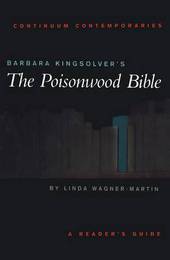
|
Barbara Kingsolver's The Poisonwood Bible: A Reader's Guide
Paperback / softback
Main Details
Description
Continuum Contemporaries will be a wonderful source of ideas and inspiration for members of book clubs and readings groups, as well as for literature students.The aim of the series is to give readers accessible and informative introductions to 30 of the most popular, most acclaimed, and most influential novels of recent years. A team of contemporary fiction scholars from both sides of the Atlantic has been assembled to provide a thorough and readable analysis of each of the novels in question. The books in the series will all follow the same structure:a biography of the novelist, including other works, influences, and, in some cases, an interview; a full-length study of the novel, drawing out the most important themes and ideas; a summary of how the novel was received upon publication; a summary of how the novel has performed since publication, including film or TV adaptations, literary prizes, etc.; a wide range of suggestions for further reading, including websites and discussion forums; and a list of questions for reading groups to discuss.
Author Biography
Linda Wagner-Martin is Hanes Professor of English and Comparative Literature at The University of North Carolina at Chapel Hill, USA. She was the 2011 recipient of the Hubbell Medal for lifetime service in American literature (sponsored by the MLA), and has received the Guggenheim fellowship, the senior National Endowment for the Humanities fellowship, the Bunting Institute fellowship, and awards from the Rockefeller Foundation, the American Philosophical Association and others. She has published more than fifty-five books of criticism, some edited, including Sylvia Plath: A Biography (1987) and "Favored Strangers": Gertrude Stein and Her Family (1995), as well as studies of Ernest Hemingway, Zelda Fitzgerald, Barbara Kingsolver, and others. Recent books are A History of American Literature from 1950 to the Present (2013) and Toni Morrison and the Maternal (2014).
Reviews"A brilliant idea--short, perceptive books which tell you what you need to know about some of the most vibrant and challenging writing around today--a bit like having a reading group in your pocket."--Ian Rankin "Well written...The chapters that deal with the text are split into parts that deal with each section of the novel. These are not a critique of the work but more like a pleasant guided tour through territory that you have already visited alone?you know the area but are delighted to have things pointed out to you that you may have missed along the way....The forthcoming list is very impressive and well worth keeping an eye on." --NewBooks.mag "The series comes as near to squaring various circles - popular / academic, 'good read' / 'classic Lit', novel / film of the book as any I know. And at best it goes a fair way towards reshuffling those categories and redrawing the boundaries. With the first volume, I was relieved. After two or three, I was hooked. The books are invaluable for gathering out-of-the-way or ephemeral comment from TV and radio interviews and the web as well as from literary reviews. Refreshingly upfront and up-to-date... Given the space, there are remarkably balanced film/novel comparisons of the most well-known examples... An important feature is the fully referenced bibliographies, including reviews and copious website addresses - the latter ranging from fanzines and authors' and publishers' own sites to academic discussion lists and online journals. In method as in subject matter, these guides move freely on the interface between print culture and multimedia. Highly finished and pleasantly handleable as books in their own right, they gesture accommodatingly to both words and worlds beyond. Taking the series as a whole, it also confirms two things: that narrative nowadays is generically highly hybrid and increasingly cross-media; and that an understanding of the processes of writing and reading 'contemporary classic' (or at least 'currently famous') fiction cannot be separated - yet must be distinguished - from the processes of making and marketing books and films." -- The Times Higher Education Supplement, May 31, 2002
|